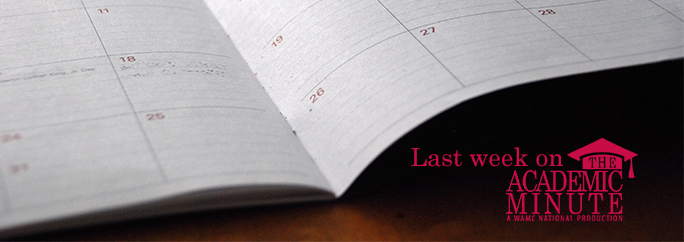The Academic Minute for 2019.01.21-01.25

Academic Minute from 01.21 – 01.25
Monday, January 21st
Rachel Engmann – Hampshire College
The Archaeology of the Slaver in 18th-Century Ghana
Rachel Ama Asaa Engmann, assistant professor of African Studies, received a B.A. in anthropology from Columbia University, an M.A. in museum studies from Columbia, an M.A. in heritage from Stanford University and a Ph.D. in archaeology from Stanford University. She also completed a postdoctoral fellowship from Brown University.
Engmann teaches courses on historical and contemporary forms of the African experience, such as African Islam, critical heritage, material culture, museums, Islamic archaeology, slave trade, slavery, and colonial photography. A scholar who applies a multiple lines of evidence approach (objects, texts, oral narratives, and ethnography), she enjoys working with students interested in engaging with a variety of documentary sources, and combining different theoretical and methodological approaches in the humanities and social sciences, in search of novel revisionist historical and contemporary approaches to the study of Africa.
Tuesday, January 22nd
Graham Hodges – Colgate University
Black New Jersey
I am currently working on three projects. The first is a one-volume history of New York City from its founding to the present. The second book project is a revision in time and space of the major American movement the Underground Railroad, which I recast as Freedom Making. The third project is a memoir of my parents’ families and my own life. I do this because in my mid sixties, I recognize that I need to tell these stories to my young sons who will never know their ancestors. I continue to seek new scholarly ventures, grateful for my post as professor of history, a job bounded only by one’s imagination.
Wednesday, January 23rd
Daniel Reinholz – San Diego State University
Reducing Implicit Bias in Teaching
Daniel Reinholz is an Assistant Professor of Mathematics Education at San Diego State University. Dr. Reinholz is a researcher and educational designer, holding a teaching credential in secondary mathematics. His research focuses on educational transformation, with the aim of increasing equity in STEM fields. Dr. Reinholz has been funded by the National Science Foundation and Institute of Education Sciences.
Thursday, January 24th
Jennifer Pomeranz – New York University
State Laws Limit Local Control Over Food and Nutrition
Professor Jennifer Pomeranz is a public health lawyer who researches policy and legal options to address the food environment, obesity, products that cause public harm, and social injustice that lead to health disparities.
Prior to joining the NYU faculty, Professor Pomeranz was an Assistant Professor at the College of Public Health at Temple University and in the Center for Obesity Research and Education at Temple. She was previously the Director of Legal Initiatives at the Rudd Center for Food Policy and Obesity at Yale University. She is the Policy Chair of the Health Law Section of the American Public Health Association. She has also authored numerous peer-reviewed and law review journal articles and a book, Food Law for Public Health, published by Oxford University Press in 2016.
Friday, January 25th
Jared Nelson – SUNY New Paltz
Fibers and Reducing Emissions
Dr. Jared Nelson is an assistant professor of mechanical engineering at SUNY New Paltz specializing in materials and solid mechanics with research focused on advances in bio-industrial materials toward realizing sustainability. He has spent nearly two decades contributing to the better understanding of material responses of fiber reinforced plastics toward development of improved engineered products. Most recently, he and his students have been studying variation in natural plant fibers to be used as sustainable replacements for synthetic fibers. He has also been a founder in the Bio-industrial Materials Institute (BMI) which endeavors to collaboratively understand the bio-industrial materials from bast fiber plants, their opportunities, and how to economically process them into useful products.

